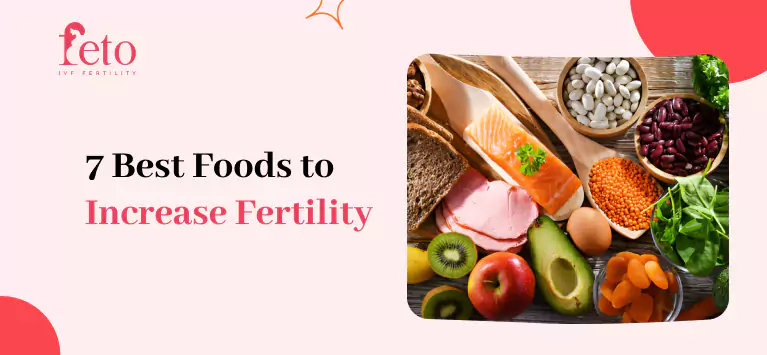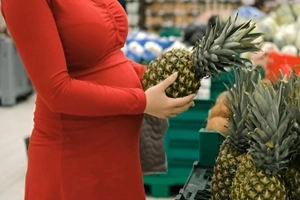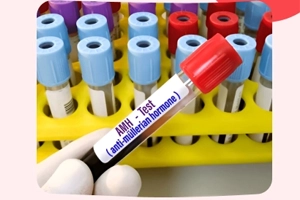
Fertility-Boosting Foods: 7 Best Choices to Conceive
When you’re trying to conceive, it’s easy to feel overwhelmed by advice. But science shows one of the most powerful things you can do to support fertility is focus on what you eat. The right foods can help regulate hormones, protect egg and sperm cells, and improve your overall reproductive health.
Below are the 7 best foods to increase fertility naturally for both men and women. These foods are rich in vitamins, antioxidants, and healthy fats that support your body as you prepare for pregnancy.
Fatty Fish (Salmon, Mackerel, Sardines)
Fatty fish are a must-have for anyone trying to conceive. They’re loaded with omega-3 fatty acids, specifically DHA and EPA which help regulate hormones, improve cervical fluid, increase blood flow to the reproductive organs, and support embryo development.
- For women, omega-3s promote regular ovulation and better egg quality.
- For men, they improve sperm count, motility, and morphology.
How to eat more:
- Grill or bake salmon twice a week
- Add canned sardines or mackerel to pasta dishes
- Try smoked salmon with eggs for a protein-rich breakfast
Tip: Choose wild-caught fish to minimize mercury exposure, which can negatively affect fertility.
Leafy Greens (Spinach, Kale, Swiss Chard)
Leafy greens are rich in folate, a B-vitamin crucial for fetal development and egg health. They’re also packed with iron, calcium, magnesium, and fiber, all essential for hormone balance.
Women with higher folate intake tend to ovulate more regularly and have a reduced risk of miscarriage. Men who get enough folate can reduce the risk of DNA damage in their sperm.
How to eat more:
- Add spinach to smoothies
- Saute kale with olive oil and garlic
- Make a rainbow salad with Swiss chard
Berries (Strawberries, Blueberries, Raspberries)
Berries are small but mighty. Packed with antioxidants like vitamin C and anthocyanins, they protect reproductive cells from oxidative damage. This helps improve egg quality and sperm function.
They also have a low glycemic index, which supports hormonal balance especially helpful for women with PCOS.
How to eat more:
- Top your morning oatmeal with mixed berries
- Blend them into smoothies
- Snack on frozen berries in the afternoon
Bonus: Berries support a healthy immune system, which is important during preconception.
Nuts and Seeds (Walnuts, Pumpkin Seeds, Chia Seeds)
Nuts and seeds are nutrient-dense fertility boosters. Walnuts, for example, are rich in omega-3s and polyunsaturated fats, which improve sperm vitality. Pumpkin seeds are high in zinc, a mineral crucial for testosterone production and sperm health.
Chia and flaxseeds offer plant-based omega-3s, fiber, and protein, helping regulate insulin and support hormone function.
How to eat more:
- Mix chia seeds into yogurt or make chia pudding
- Snack on a small handful of walnuts daily
- Sprinkle ground flax or pumpkin seeds onto soups and salads
Whole Eggs (Especially the Yolks)
Eggs are one of the most complete fertility foods. They contain high-quality protein, choline, vitamin D, and B vitamins, all of which support reproductive health.
Choline, found mostly in the yolk, is essential for fetal brain development and implantation success. Vitamin D helps regulate menstrual cycles and supports hormone production.
How to eat more:
- Have 1–2 boiled eggs for breakfast
- Add eggs to salads or wraps
- Make veggie-filled omelets or frittatas
Note: Don’t skip the yolk, it’s where the fertility-boosting nutrients live.
Legumes (Lentils, Chickpeas, Black Beans)
Legumes are rich in plant-based protein, iron, and folate, making them a powerful fertility food for both men and women. They’re also a great source of fiber, which helps stabilize blood sugar and reduce inflammation.
Women who replace animal proteins with plant-based proteins have a lower risk of ovulatory infertility.
How to eat more:
- Cook lentil soups or stews
- Use chickpeas to make hummus or roasted snacks
- Add black beans to tacos or burrito bowls
Tip: Pair legumes with vitamin C-rich foods (like bell peppers or lemon juice) to increase iron absorption.
Avocados
Avocados are packed with monounsaturated fats, folate, potassium, and vitamin E. These nutrients support hormonal balance, reduce inflammation, and improve the quality of both eggs and sperm.
They also help increase the thickness of the uterine lining, which may improve the chances of implantation.
How to eat more:
- Spread mashed avocado on whole-grain toast
- Blend half an avocado into a smoothie
- Top your salads, tacos, or grain bowls with diced avocado for a creamy, nutritious boost.
Research shows that women undergoing IVF who ate more monounsaturated fats had better success rates.
More Fertility Nutrition Tips
Eating these seven foods is a great start but your entire eating pattern matters. Here are a few extra tips:
- Stay hydrated: Aim to drink 8–10 glasses of water each day to stay well hydrated.
- Eat a variety of colors: Different fruits and vegetables offer different fertility-supporting nutrients.
- Limit processed foods: Cut down on trans fats, sugary snacks, and fast food.
- Watch your caffeine and alcohol: Too much of either can affect hormone balance.
- Maintain a healthy weight: Both underweight and overweight conditions can reduce fertility.
Final Thoughts
Fertility isn’t just about supplements or treatments, it starts with what you put on your plate. These seven foods are backed by research and packed with nutrients that naturally support conception. Whether you’re just starting your journey or actively trying, eating a fertility-friendly diet is a step in the right direction.
Start small. Add one new food each week, and over time, you’ll create habits that support your body’s ability to conceive.

















